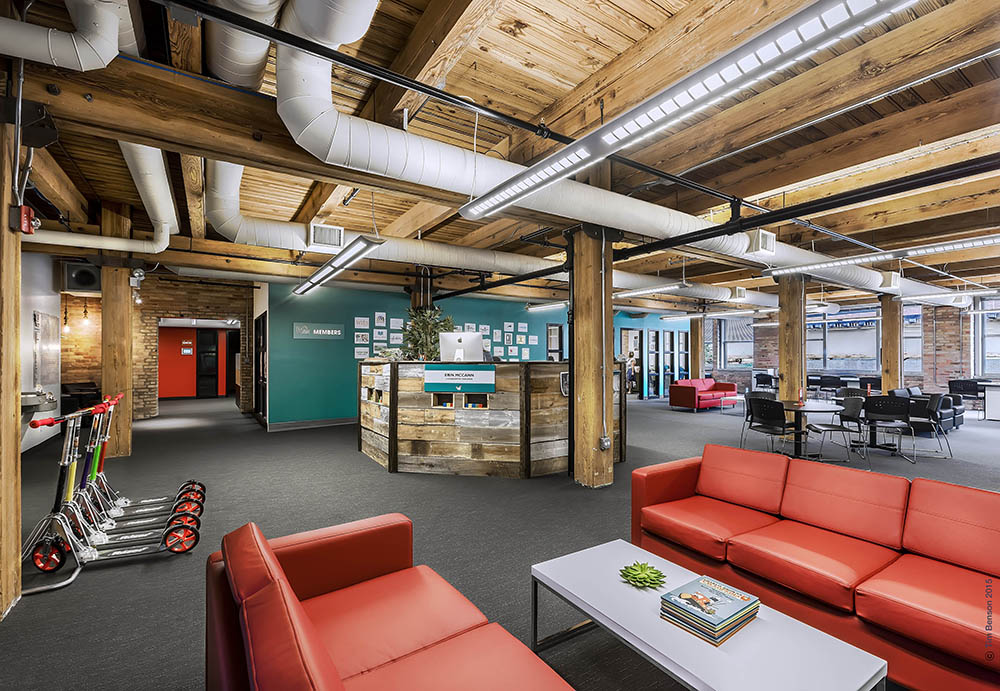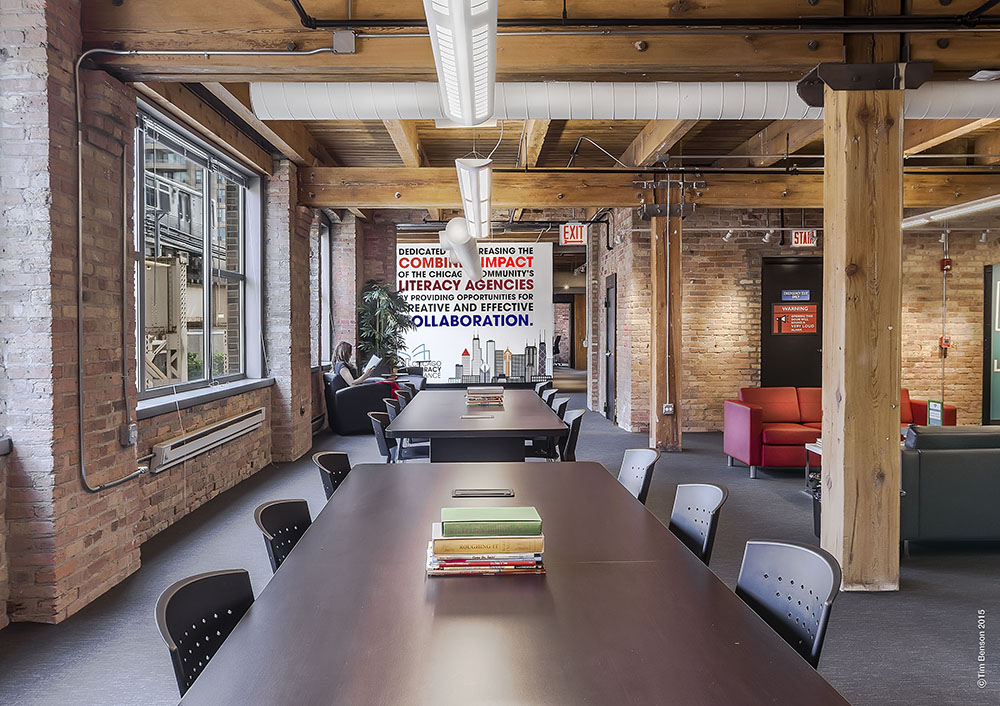
In 2009, sparked by the realization that they were all working in the same failing school and yet had no idea of each other’s programs or impact, 19 Chicago-area literacy organizations decided to experiment with collaboration. Chicago was a prime candidate for increased impact: 49 percent of fourth graders scored at below basic levels of reading proficiency, and 30 percent of its adults (880,000 people) would have benefited from basic adult literacy services. From that first meeting the Chicago Literacy Alliance (CLA) grew, formed with a collective passion to help people of all ages and backgrounds receive the literacy support they need. These member agencies now represent extensive practical knowledge and expertise in every category of literacy programming, and by facilitating creative and effective collaboration among them, the CLA is dedicated to achieving a 100 percent literate Chicago.
As time passed, the CLA saw a need for a physical space to not only bring people together but also to grow their capacities to be more effective in their work. Until then, these organizations worked in spaces across the city, whether in small office spaces, homes, or coffee shops. When the CLA built the Literacenter in 2015, they brought all the member organizations together for the first time to a fun, energizing space where rent was 70 percent less than market value for comparable offices in the area. As the first nonprofit shared workspace dedicated to literacy in North America, the Literacenter’s 41,000 square feet co-working space hosts 11 resident member organizations, 15 meeting and conference rooms, two large events spaces, programming and events, and more. Since the Literacenter opened in May of 2015, the Chicago Literacy Alliance has grown from 18 to more than 100 member organizations. These organizations attend programs, form partnerships, serve students, create collaborations, and accelerate their work at the Literacenter.
For years, many of the organizations in the CLA membership had substandard workspaces. Many worked remotely from homes, coffee shops, or small spaces throughout the city. The idea of a shared workspace opened up the possibility to not only work together but also to increase capacity and reduce expenses. In the trend of shared workspaces such as popular Chicago tech incubator 1871, CLA co-founder Stacy Ratner saw Chicago as the perfect place to open a shared workspace dedicated to literacy. Ratner had been a resident of 1871 and saw its effectiveness to grow and develop its residents. She believed the same approach could work for nonprofits working toward a shared cause and vision.

The Literacenter is a major statement for the cause of literacy, providing the physical manifestation of the CLA’s commitment to literacy in Chicago. The CLA has seen that the overall model of a shared workspace is key to achieving their vision of a 100 percent literate city. Research of more than 350 nonprofit shared workspaces operating in North America shows that places like the Literacenter increase effectiveness, efficiency, and impact, and are a proven accelerator of positive change across a field. In an impact study co-sponsored by The Kresge Foundation and The Lodestar Foundation, the Nonprofit Centers Network (NCN) demonstrated that, among nonprofit organizations in shared workspaces:
- 72 percent experienced improvement in awareness/credibility;
- 65 percent experienced enhanced staff morale;
- 66 percent experienced greater collaboration, leading to better effectiveness; and
- 68 percent experienced significant improvement in their ability to achieve their mission.
CLA member Chicago HOPES for Kids is one of the organizations that experienced improvement in awareness and credibility of their organization because of their participation in the shared workspace. Their organization provides critical literacy tutoring to homeless youth. When they joined the CLA in June of 2015, Chicago HOPES for Kids was an emerging organization that needed space to continue to grow instead of being stifled in an office that functioned as storage. There was a lack of space to work, their team had to work remotely, and volunteer trainings were held in various locations in shifts. The Literacenter has provided Chicago HOPES for Kids with a legitimate place where its staff can feel confident in the organization. Since their move to the Literacenter, they can consolidate trainings, increase the capacity of staff, and mobilize volunteers. Without this space, they could not have easily expanded their organization and reach to provide literacy programming at homeless shelters across the city.
The Literacenter was also able to meet significant needs for CLA member Literacy Chicago. When state budget cuts impacted their ability to provide their programming, Literacy Chicago needed an affordable location to continue facilitating their adult education classes. The Literacenter provided a haven for them, and they were able to maintain their programming with reduced rental costs. "I feel proud that we've been able to sustain and continue our programs," Rich Dominguez, Executive Director of Literacy Chicago, says. "Many other literacy organizations have had to cut or reduce their programming. This is a new beginning." Overall, moving to the CLA reduced Literacy Chicago's monthly rent and utility expenses by 85 percent.
The CLA is currently funded by various foundations. Membership fees and office rental space make up approximately 30 percent of its operating costs. It also hosts two fundraisers each year, the Grim Reader’s Revelry, a Halloween-themed party, and their spring fundraiser, Night of 300 Books.
The power, energy and atmosphere of the Literacenter are unique to this nonprofit shared workspace model. Ratner and founding executive director Mike Ban believed that nonprofit work should be celebrated. Much like those who work at 1871, they thought that nonprofit professionals deserved a space that was fun and inviting. The Literacenter is filled with whimsical features including rooms named using book puns, Roomeo and Juliet is a fan favorite, Literascooters, bright colors, and books throughout the space. A LitLounge filled with game tables and other entertainment adds to the atmosphere for its members, and the Literacenter has earned the nickname “Disneyworld for word nerds.” Ratner and Ban understood that people would be drawn to a fun and inviting space, and the growth from 18 to 100 member organizations in a year and a half more than supports this idea.
The Literacenter has been transformative for its members. The CLA has seen a substantial amount of increased collaboration, relationship building, and engagement within its membership. In a survey of 100 members during its first year of operations, 91 percent considered the Literacenter to be fun, 92 percent found it functional, and 62 percent said the space helped their team work more efficiently. The workspace has enhanced members’ staff, program, and volunteer offerings; exposed them to more opportunities for collaboration; increased their capacity; and improved their ability to provide literacy services throughout Chicago. CLA member Chad Flores of Roots of Success captured the Literacenter’s impact best when he said, “The Literacenter is the best place to learn about the most interesting projects advancing literacy in Chicago. It inspires our small staff to work with and learn from the other members. No other place offers this unique ecosystem of resources specifically geared toward literacy programs, which serves such a diverse set of learners.”
Sources:
National Assessment of Educational Progress from the National Center for Education Statistics)
Southern Illinois University – Edwardsville, Department of Economics and Finance, APC #508 FY 2011 Demographic Data)


